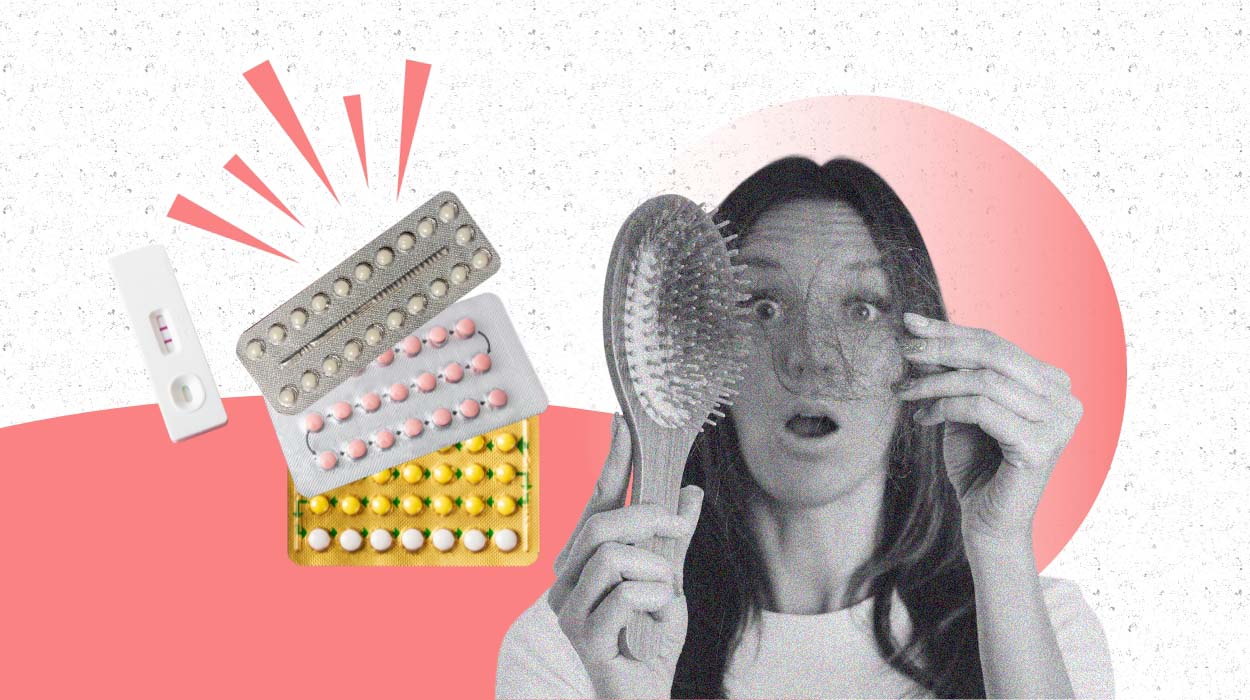 Expert's opinion
Expert's opinion
Expert's opinion
The article is a subjective view on this topic written by writers specializing in medical writing.
It may reflect on a personal journey surrounding struggles with an illness or medical condition, involve product comparisons, diet considerations, or other health-related opinions.
Although the view is entirely that of the writer, it is based on academic experiences and scientific research they have conducted; it is fact-checked by a team of degreed medical experts, and validated by sources attached to the article.
The numbers in parenthesis (1,2,3) will take you to clickable links to related scientific papers.
Can Birth Control Cause Hair Loss? Get Answers From Experts In 2024

Birth control is one of the most common methods of preventing pregnancy. Like any medication, it has side effects. It is common for women to wonder if birth control can cause hair loss, as many women have expressed a concern that this is one of the adverse effects of taking it.
The type of hormones used for birth control can influence hair loss. For example, several types of progestins are associated with alopecia, so it is essential to know the composition of the birth control being taken to identify the source of your hair loss.
This article aims to explain whether birth control causes hair loss and, if so, what treatments can effectively reverse the hair fall trend.
Can Birth Control Cause Hair Loss?
Does birth control cause hair loss? Yes, birth control can cause hair loss due to hormonal factors that genetics may also impact. The impact of some birth control methods on the hormones of those taking them can lead to weaker hair and more effortless hair loss. Genetic hair loss sufferers may experience volume loss and thinning hair due to over-sensitivity to the components of some contraceptives.
How Does Birth Control Work?
Birth control works by preventing fertilization by one of several methods.
- It can prevent the sperm from reaching the egg.
- It may inactivate or destroy the sperm.
- Birth control may alter the lining of the uterus so the egg cannot attach to it.
- It may thicken cervical mucus so the sperm cannot pass through it.
In short, hormonal birth control methods prevent the formation of the ovum. Some methods include implants that release progestin, preventing ovulation and changing the cervical mucus making it harder for the sperm to reach the egg. The IUD is a device that goes into the uterus and may release hormones or copper that prevent the egg’s implantation. And let’s not forget the birth control pill, which may have progestins and/or estrogen in them.
How Birth Control Affects Your Hair

Birth control affects hair differently, impacting its thickness, texture, and growth. Some women may experience thinner[1] and more fragile hair due to the type of contraceptive they take.
Birth control pills may have two active hormones, estrogen and progestin. Progestin is a synthetic progesterone that prevents ovulation, thins the endometrium, and thickens cervical mucus, all incompatible with fertilization. Progesterone[2] is a hormone that blocks dihydrotestosterone – the masculinizing hormone responsible for hair loss, and also happens to control your period and prepare your body for pregnancy.
There are many associated causes[3] of hair loss connected with using birth control, such as genetics, environment, inflammation, and hormones. Birth control may contain progestin and estrogen, estrogen-only, or progestin. Therefore, it may influence hair loss. But, like with any medication, there may be side effects. Hair loss can be a side effect in those who use hormonal contraceptives, but very few studies exist.
It is known that estrogen promotes hair growth,[4] so hormonal birth control with only estrogen in it will not cause hair loss. Estrogen extends the anagen phase of the hair growth cycle, thus preventing female pattern hair loss, so typical after menopause when estrogen levels fall.
However, some data has linked progestins with androgenic alopecia.[4] One case study involved a woman with hair loss and an IUD with levonorgestrel (a type of progestin); when the IUD was removed, hair started growing again, suggesting an association. In a study of 15,000 Finnish women with this IUD implanted, 15.7% reported hair loss. Few studies have evaluated the antiandrogenic progestin birth control pill unavailable in the U.S. for hair loss side effects.
A combined estrogen-progestin birth control pill has been associated with unusual hair growth patterns,[5] including hair loss.
Other Side Effects

Birth control side effects are present like in any medication. Some are milder, and others stronger. Depending on the type of contraceptive used, birth control methods affect those who use them differently, i.e., as a sponge, IUD, or pill.
Regarding hormonal contraceptives, one of the most common adverse effects of combined oral contraceptives is breakthrough bleeding. This means that women experience bleeding on the days they take inactive pills. Other effects include nausea, breast tenderness, abdominal cramps, and headaches.
Irregular bleeding[6] is often one of the most common effects of those using birth control injections. Decreased libido is also another symptom because progesterone suppresses the effects of estrogen. Weight gain and headaches may also occur.
Intrauterine device users may experience abnormal uterine bleeding as one of the main adverse effects. The uterus can also suffer perforations,[7] but studies show that this effect is rare. Those who use barrier methods, such as condoms, may experience irritation or allergic reactions.[8] This is because of the type of material used in condoms or any lubricant used during intercourse.
How To Stop Hair Loss From Birth Control
In cases of birth control hair loss, it is essential to identify its components. Birth control contains hormones that produce changes in the body, affecting it both negatively and positively.
It is important for people suffering from hair loss to be aware of the type of hormonal problem they are dealing with in their contraceptive method. Progestin may be present in birth control; some synthetically produced ones can cause greater hair loss.[1] Some of the most common ones are levonorgestrel or the post-menopausal drug tibolone.
When the influence of birth control is identified, one action to stop hair loss is to change the method. If hair loss occurs when you stop taking the birth control pill, it is likely because of decreased estrogen. Estrogens are present in many birth control pills, which is one reason why many women report experiencing shinier, fuller hair and better skin when using them.
At first, hair loss is normal if you stop taking birth control pills containing estrogen, which is no cause for alarm. This is a temporary problem, which usually resolves when hormone levels return to balance.
Tips To Make Hair Grow Faster
There are many ways to help hair grow faster, but it is essential to understand how this process works. Understanding the hair growth cycle may help understand the process.
Over 85% of hair is in the hair growth or anagen stage. This phase varies depending on where your hair is located. The anagen phase on head hair is longer as it takes longer to grow out of this stage.
In the catagen phase, the hair follicle rests and has no growth. In the telogen phase, the hair falls out, lasting about three months; about 10% of your hair is in this phase. Knowing the hair growth cycle can help you understand what stage your hair is in to identify if a problem goes beyond its phase cycle.
Some hair treatments to stimulate hair growth tips are:
Eat A Healthy Diet
Hair is cared for from the outside and the inside. A balanced and healthy diet[9] can help hair grow faster and healthier. Eating foods containing protein, vitamins A, C, E, and B complex, iron, and zinc are beneficial. Some foods to include in the diet are meats, fish, eggs, carrots, oranges, lemons, tomatoes, almonds, cereals, salmon, nuts, beans, and seafood.
There are times when people, due to specific allergies or some foods that are not to their liking, do not consume them, so choosing supplements to boost your intake is an option.
Protect Your Hair From Damage By Heat Tools Or Certain Types Of Hairstyles
Constant use of heat tools such as straighteners, blowers, and curling irons can negatively affect the hair causing hair thinning. Hair exposed to heat without protection and care can break, making growing difficult. When using any heat tool, the hair should be prepared. Use heat protectors and reduce the use of heat tools as much as possible.
Try to use hairstyles that are not too tight, which can cause the hair to break more easily. Use hair bands that are not too thin, and style your hair in various ways, as similar styling day after day can put your hair at risk of thinning out.
Reduce chemical processes such as dyeing or straightening, contributing to hair thinning. Doing these processes constantly mistreats the hair and can cause breakage.
Invest In Products According To Your Hair´s Needs
Hair care is essential for healthy hair growth. Identify your hair’s needs and purchase the necessary products. If your hair needs moisture, focus on that problem. If your hair is weak and breaks easily, use products with protein to help strengthen it.
Sometimes people think their hair doesn’t grow like it used to, which may be untrue. Hair generally grows at the same rate, but the changes will not be noticeable if you don’t take care of it.
Final Thought
You have the answer “Can birth control make your hair fall out?” The presence of some types of progestin in birth control can cause hair loss. Contraceptives, genetic predisposition, and other factors can aggravate hair loss. When considering birth control pills, you must express your concerns to your doctor and have a medical history taken to know which one is right for you.
Treating hair loss resulting from using or disusing contraceptives is only part of the process. To prevent hair loss and stimulate hair growth, lifestyle changes such as improving your diet, protecting your hair from heat tools, and caring for your hair with products according to your needs must be done. If hair loss continues despite your best efforts, consult a dermatologist for expert advice.
+ 9 sources
Health Canal avoids using tertiary references. We have strict sourcing guidelines and rely on peer-reviewed studies, academic researches from medical associations and institutions. To ensure the accuracy of articles in Health Canal, you can read more about the editorial process here
- Graves, K.Y., Smith, B. and Nuccio, B.C. (2018). Alopecia due to high androgen index contraceptives. [online] 31(8), pp.20–24. doi:https://doi.org/10.1097/01.jaa.0000541476.24116.c4.
- Grymowicz, M., Rudnicka, E., Agnieszka Podfigurna, Napierała, P., Smolarczyk, R., Katarzyna Smolarczyk and Blazej Meczekalski (2020). Hormonal Effects on Hair Follicles. [online] 21(15), pp.5342–5342. doi:https://doi.org/10.3390/ijms21155342.
- Yasmeen Jabeen Bhat, Saqib, N.U., Latif, I. and Hassan, I. (2020). Female pattern hair loss—An update. [online] 11(4), pp.493–493. doi:https://doi.org/10.4103/idoj.idoj_334_19.
- Desai, K., Almeida, B. and Mariya Miteva (2021). Understanding Hormonal Therapies: Overview for the Dermatologist Focused on Hair. [online] 237(5), pp.786–791. doi:https://doi.org/10.1159/000512888.
- Medlineplus.gov. (2015). Estrogen and Progestin (Oral Contraceptives): MedlinePlus Drug Information. [online] Available at: https://medlineplus.gov/druginfo/meds/a601050.html
- Millán, M. and Castañeda, S. (2015). Sex Hormones and Related Compounds, Including Hormonal Contraceptives. [online] doi:https://doi.org/10.1016/bs.seda.2015.06.014.
- Xu, X., Ruan, X. and Rabe, T. (2021). Intrauterine contraception and menstrual bleeding. [online] 5(2), pp.66–69. doi:https://doi.org/10.1016/j.glohj.2021.05.002.
- Marfatia, Y.S., Pandya, I. and Mehta, K. (2015). Condoms: Past, present, and future. Indian journal of sexually transmitted diseases and AIDS, [online] 36(2), pp.133–9. doi:https://doi.org/10.4103/0253-7184.167135.
- Rajput, R.J. (2022). Influence of nutrition, food supplements and lifestyle in hair disorders. [online] 13(6), pp.721–721. doi:https://doi.org/10.4103/idoj.idoj_175_22.



